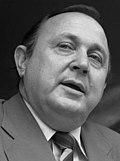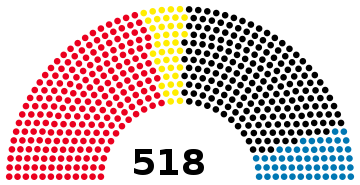This article needs additional citations for verification .(September 2022) |
| |||||||||||||||||||||||||||||||||||||||||
All 496 seats in the Bundestag [a] 249 seats needed for a majority | |||||||||||||||||||||||||||||||||||||||||
|---|---|---|---|---|---|---|---|---|---|---|---|---|---|---|---|---|---|---|---|---|---|---|---|---|---|---|---|---|---|---|---|---|---|---|---|---|---|---|---|---|---|
| Registered | 42,058,015 ( | ||||||||||||||||||||||||||||||||||||||||
| Turnout | 90.7% ( | ||||||||||||||||||||||||||||||||||||||||
| |||||||||||||||||||||||||||||||||||||||||
 The left side shows constituency winners of the election by their party colours. The right side shows party list winners of the election for the additional members by their party colours. | |||||||||||||||||||||||||||||||||||||||||
| |||||||||||||||||||||||||||||||||||||||||
| This article is part of a series on the |
| Politics of Germany |
|---|
 |
Federal elections were held in West Germany on 3 October 1976 to elect the members of the 8th Bundestag. Although the CDU/CSU alliance became the largest faction in parliament, Helmut Schmidt of the Social Democratic Party remained Chancellor.



